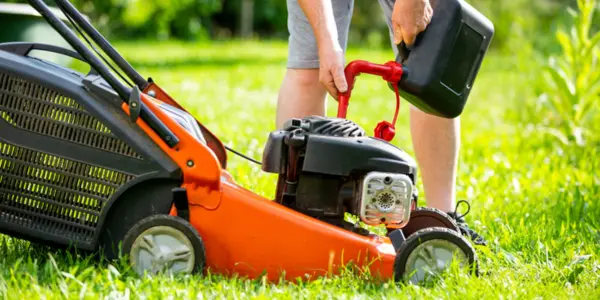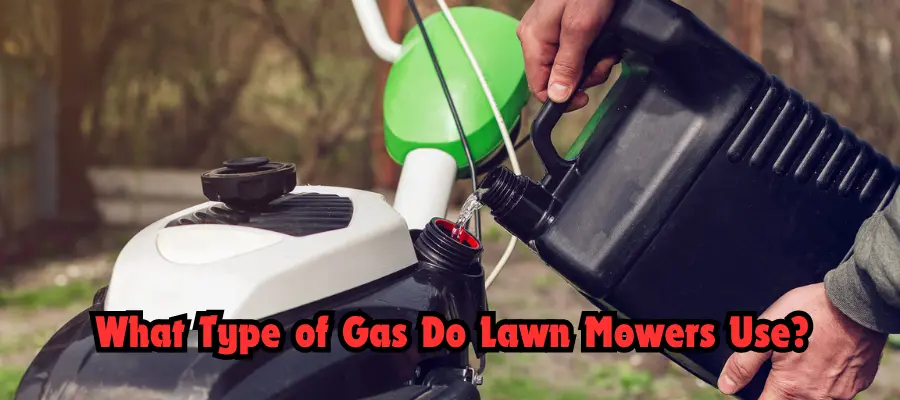What Type of Gas Do Lawn Mowers Use? Choosing the right type of gas for your lawn mower is crucial for maintaining its performance and longevity. Using the wrong kind of fuel can lead to engine problems, reduced efficiency, and even permanent damage.
This article will help you understand the differences between regular, premium, and non-ethanol gasoline, and why selecting the correct type can make a significant difference in your lawn mower’s operation.
Whether you’re a seasoned gardener or a first-time mower owner, this article is designed to provide you with all the information you need to keep your mower running smoothly.
Understanding Gasoline Types
Types of Gasoline
Gasoline comes in various formulations, each with distinct characteristics and benefits. For lawn mowers, understanding these differences is essential to ensure optimal engine performance and durability.
Regular Gasoline
Regular gasoline, often referred to as 87-octane fuel, is the most commonly available type of gasoline. It is widely used in a variety of engines, including cars and small engines like those in lawn mowers.
This type of gas contains up to 10% ethanol (E10), which is an alcohol-based additive used to reduce emissions. The presence of ethanol helps in reducing greenhouse gas emissions, making regular gasoline a more environmentally friendly option.
Premium Gasoline
Premium gasoline, also known as high-octane fuel, typically has an octane rating of 91 or higher. This type of gas is designed for high-performance engines that require higher compression ratios.
While it is more expensive than regular gasoline, it is believed to offer better engine protection and performance for certain types of engines.
Premium gasoline burns cleaner and more efficiently, which can lead to less carbon buildup inside the engine. This might be beneficial for lawn mowers with high-performance engines or those used in demanding conditions.
Non-Ethanol Gasoline
Non-ethanol gasoline, sometimes called pure gas, does not contain ethanol. This type of fuel is preferred for small engines, including those in lawn mowers, because it does not attract moisture and does not cause the same level of corrosion as ethanol-blended fuels.
Non-ethanol gas has a longer shelf life and is less likely to cause issues during storage. It’s especially useful for equipment that is stored for long periods between uses, as it helps prevent issues related to fuel degradation and moisture absorption.
| Type of Gasoline | Octane Rating | Ethanol Content | Ideal Use | Cost |
|---|---|---|---|---|
| Regular Gasoline | 87 | Up to 10% | Most cars and small engines | Low |
| Premium Gasoline | 91+ | Up to 10% | High-performance engines | High |
| Non-Ethanol Gasoline | Varies | 0% | Small engines, equipment stored long-term | Medium-High |
The Benefits of Non-Ethanol Gasoline
Why Non-Ethanol Gasoline is Preferred

For lawn mowers and other small engines, non-ethanol gasoline offers several advantages:
Longer Shelf Life
Non-ethanol gasoline has a longer shelf life compared to ethanol-blended fuels. When stored properly, non-ethanol gas can last up to six months without significant degradation. In contrast, ethanol-blended fuels like E10 (10% ethanol) can start to degrade and form gum and varnish within a few months, especially if exposed to moisture.
Reduced Engine Damage
Small engines, such as those in lawn mowers, chainsaws, and trimmers, are not designed to handle fuel with high ethanol content. Ethanol can attract moisture, leading to phase separation and the formation of water in the fuel tank. This can cause corrosion and damage to the engine’s internal components. Non-ethanol gasoline eliminates these risks, ensuring better engine protection and longevity.
Availability and Cost
Non-ethanol gasoline can be harder to find and is typically more expensive than ethanol-blended fuels. However, many specialty gas stations and marine fuel suppliers offer non-ethanol options. The higher cost is often justified by the benefits of improved engine performance and reduced maintenance issues.
Conclusion
Choosing the right type of gasoline for your lawn mower is essential for maintaining its performance, efficiency, and longevity. Regular gasoline is suitable for most lawn mowers, but non-ethanol gasoline offers clear advantages in terms of engine protection and fuel stability. Premium gasoline may provide some benefits for high-performance engines, but it is generally not necessary for standard lawn mowers.
By understanding the differences between regular, premium, and non-ethanol gasoline, you can make an informed decision that ensures your lawn mower runs smoothly and lasts longer. Always follow the manufacturer’s recommendations and consider the specific needs of your equipment when selecting fuel. With the right gasoline, you can keep your lawn mower in top condition and enjoy a well-maintained lawn all season long.

